Measles outbreak traced back to VACCINATED woman who spread this disease

(NaturalNews) As published in the Clinical Infectious Diseases journal, the 2011 measles outbreak in New York has been confirmed to have originated from a fully vaccinated woman, according to a study conducted by the New York City Department of Health and Mental Hygiene, the Westchester County Department of Health and the U.S. Centers for Disease Control and Prevention (CDC).
Scientists have previously known that the measles vaccine could sometimes fail to deliver full protection. Even in cases where vaccinated persons have contracted the disease, it was thought that they could not pass it on to others.
The new findings, however, challenge that conventional wisdom, and raise the question of what other assumptions about vaccines might also turn out to be mistaken.
Immune response of unvaccinated person
In 2011, when a 22-year-old theater employee in New York City was diagnosed with the measles, doctors saw from her records that she had been fully vaccinated against the disease. Assuming that she should be incapable of infecting others, they released her without taking any public health precautions. The new study found, however, that she went on to infect four other people with the measles, two of them also fully vaccinated. Tests also confirmed that the other two people infected, though unvaccinated, had previously been exposed to measles and therefore should have had natural immunity to it.
It is the first confirmed case of measles transmission by someone who had already received two doses of the measles vaccine.
In the new study, researchers analyzed blood samples taken during the treatment of the initial patient, dubbed "Measles Mary." These tests confirmed that her body did not show any signs of vaccine-induced protection against the measles virus.
The body's first line of defense against viral infection is known as IgM antibodies, but this initial defense is not tailored to the specific virus and is therefore imperfect. Once the body has had enough exposure to a specific virus, it is able to produce stronger, more effective IgG antibodies, which neutralize viruses and prevent them from entering the body's cells. A prior measles infection or vaccination is supposed to have given the body enough experience with a virus that it can mount a quick IgG defense in cases of subsequent exposure, skipping the less effective IgM step. The body's ability to produce IgG antibodies following vaccination has been thought to last for decades, even without subsequent exposure. A naturally acquired immunity is thought to last even longer.
Yet in the case of Measles Mary, the researchers found that her body acted as if it had never been exposed to measles, mounting an immediate IgM defense. And while her blood did contain high levels of anti-measles IgG antibodies, these antibodies seemed incapable of neutralizing the measles virus. The researchers interpreted this to mean that the immunity conferred by the vaccine had worn off.
Case shows scientists don't know as much as they think they do
According to lead researcher Jennifer Rosen, the case shows that "the actual duration [of immunity] following infection or vaccination is unclear."
The four people infected by Measles Mary all showed full antibody responses, as would be expected from people previously exposed to the measles virus (or vaccine). None of them infected anyone else.
This is only the latest report to cast doubt on claims that vaccines always confer true immunity. In a recent whooping cough (pertussis) outbreak in Reno County, Kansas, county health department officials reported that the majority of cases occurred in people who had already been vaccinated. A previous outbreak in Cape Cod, Massachusetts also showed a similar pattern.
Sources used:
GovernmentSlaves.info
OxfordJournals.org
NaturalNews.com
NaturalNews.com
Learn more: http://www.naturalnews.com/051587_measles_outbreak_vaccines_spreading_disease.html#ixzz3olOO0h51


